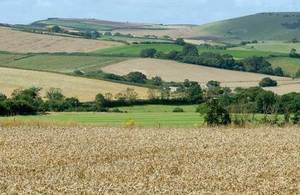UK government support for resilient and sustainable agriculture in Philippines as part of global food security
British Embassy Manila is calling for proposals on collaborative research that will underpin the long-term sustainable production of rice

farm country
Food security is one of the greatest global challenges we currently face. In a bid to address this, a new collaboration between the United Kingdom and four countries in Asia, including the Philippines, will support research projects to boost the resilience and sustainability of rice production in the region. Britons are as fond of rice as Filipinos.
The British Embassy in Manila is calling for proposals on collaborative interdisciplinary research that will underpin the long-term sustainable production of rice, utilising the combined strengths of academic research groups within China, the Philippines, Thailand, Vietnam and the UK. This initiative is supported by the UK Government’s Newton Fund which helps build science and innovation partnerships with key emerging economies.
British Ambassador Asif Ahmad said:
In a country where rice is a main part of almost every meal, enhancing rice production is a major priority. The headlines report that El Niño may be the most intense the country has experienced in recent years. Studies have shown that climate change will have a devastating effect of food security if it is not addressed now. Unli rice may no longer be a promo offer. This project will help farmer productivity and enhance trading in rice, when necessary. We encourage all researchers who are working towards the adequate supply of this staple food to submit their applications to the Newton Fund.
The UK Biotechnology and Biological Sciences Research Council (UK BBSRC) and the UK Natural Environment Research Council, in collaboration with Philippine Partners Department of Science and Technology Philippine Council for Agriculture Aquatic and Natural Resources Research & Development (DOST-PCAARD) and the Department of Agriculture Philippine Rice Research Institute (DA-PhilRice) are calling for submissions of research proposals to address the following challenges in the Philippine context: greater resilience to biotic and abiotic stresses; improved resource use efficiency (including Nitrogen, Phosphorus, Water); improved quality of rice (including nutritional enhancement and grain quality); utilisation of rice by-products; novel research tool and technology development supporting the above areas (including systems biology, bioinformatics, screening and characterisation of germplasm for gene and trait discovery).
These priority areas in sustainable rice research have been agreed though a regional workshop in Bangkok, Thailand last April, which brought together relevant funding agencies, key research organisations and leading academics from China, the Philippines, Thailand, Vietnam and the UK.
Proposed projects should be up to a maximum duration of 3 years and will require a UK Principal Investigator as well as a Philippine Principal Investigator with the options of additional Principal Investigators from other partner countries.
The deadline for submission of applications is on 13 August 2015. For more information on this opportunity, please visit the UK BBSRC website
Notes:
The Newton Fund is a Research and Innovation Fund of £375 million to support science and innovation partnerships with emerging knowledge economies. Programmes in the Philippines are being allocated around PHP711 million until 2019.
The Newton Fund helps promote the economic development and social welfare of partner countries, recognising that science, technology, and innovation capability are essential to drive long-term sustainable growth and to develop new technologies that would benefit the most vulnerable in society.
The UK Government through its embassies works with local institutions such as the Department of Science and Technology (DOST) and the Commission on Higher Education (CHED) and with UK delivery partners which include the British Council, Medical Research Council (MRC), Biotechnology and Biological Sciences Research Council (BBSRC), and the Royal Academy of Engineering. Priority areas are: health and life sciences, improving environmental resilience, energy security, future cites, agritech, and digital, innovation and creativity. The fund will support projects such as: joint research on development topics; student and researcher fellowships and mobility schemes; challenge funds to develop innovative solutions on topics of interest to developing nations; and science and innovation capacity building activities.
The Fund will cover three broad categories of activity:
-
People: capacity building activities, exchanges, and fellowships;
-
Programmes: research collaborations on development topics; and
-
Translation: innovation partnerships.
The Philippines funding partners for the rice project are:
-
Philippine Council for Agriculture, Aquatic and Natural Resources Research and Development (PCAARRD) under the Department of Science and Technology (DOST) The Council formulates policies, plans, and programs for science and technology-based research and development in the different sectors under its concern. It coordinates, evaluates, and monitors the national research and development (R&D) efforts in the agriculture, aquatic, and natural resources (AANR) sectors. It also allocates government and external funds for R&D and generates resources to support its program.
-
DA Philippine Rice Research Institute leads the strategic efforts in national rice science for development and helps ensure rice self-sufficiency and food security by increasing the productivity and profitability of farmers in a sustainable and competitive manner.